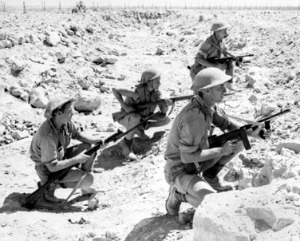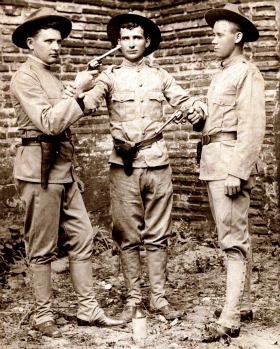Thomas E. Ricks's Blog, page 247
June 20, 2011
Don't listen to Tom rave about Buffett: Liquidity ain't like combat readiness

When Mike Zak talks about finance, I listen.
You should too.
By Michael J. Zak
Best Defense guest
columnist
For most of us in the investment business,
"liquidity" is just a fancy name for having lots of uncommitted cash (or other liquid holdings, often called "cash equivalents") on your balance sheet. All Buffett
means is that when an investor is "fully invested," especially in illiquid assets,
he doesn't have the flexibility to take advantage of an investment opportunity when it comes along unexpectedly because he doesn't have the cash to act.
Rather than "readiness," I'd look at this more like basic infantry tactics. One of the first things you learn (at least at the battalion level, as I recall from my long-ago days at The Basic School) was to keep one of your maneuver units in "reserve" (sometimes called a
"quick reaction force"). You never quite know when you might have a threat you didn't anticipate, or when you might have an opportunity you can exploit, so you keep that one maneuver unit off to the side and deploy it when that opportunity (or threat) comes along.
One of the tendencies in the investment business is that investment managers like to be "fully invested." Having cash sitting on a
balance sheet, and not "at work," is in some places considered poor form.
What Buffett is saying is that he doesn't care whether it's poor form or not, he's going to hold cash in reserve and look for weaknesses in asset values (in his case, the assets are securities of some kind and, on occasion, entire companies).
Historically, one of the differences between business and the DOD is that businesses are always "at war." In general the notion of
"readiness" probably wouldn't apply since in business you are operational every day.
Michael Zak is a
General Partner at Charles River
Ventures, a venture capital firm in Boston and Menlo Park. He invests
in early stage companies where the business is based on innovative energy
technology. He also sits on the board of directors of good old CNAS.
Sure, shrink the defense budget -- but give even more bucks to Special Operations!

If you put that proposition to the public, I think they'd
agree. Lately, in the wake of getting
bin Laden, there have been two books about Navy SEALs on the New
York Times bestseller list, Seal
Team Six and The
Heart and the Fist. Here one guy
steeped in the subject makes the argument.
By J. Michael Barrett
Best Defense guest columnist
A new question is circling around the Pentagon: With bin
Laden out of the way, is it time for the Pentagon to get back to planning for
and fighting large wars? A decade
without any further any attacks on the scale of 9/11 indicates that perhaps the
Bush administration overestimated (albeit justifiably) the capabilities of al
Qaida and its ilk. Is it time to
recalibrate our strategic approach to our global commitments and
interests? How best do we allocate our
military and other national security resources for the near, mid and long term?
The desire to move away from low level conflicts is
understandable. Our decade-long detour
into asymmetric warfare has been bruising and all encompassing, causing all
manner of strategic and operational changes and a refocusing of attention away
from traditional warfare and into the messy arena of low-intensity conflict
and, perhaps inevitably, of mission creep into nation building. Now there is a new sense we can put all that
behind us, that the past decade was an aberration and the military ought to go
back to dealing with large nation state capabilities. But abandoning the emphasis on Special
Operations Forces (SOF) and their role in winning small, dirty wars would
be a grave mistake. [[PAGEBREAK]]
First, it is clear operations by non-state actors and
insurgents attempting to take over faltering nations will continue to plague
the global community with high frequency in coming decades. That means more assignments for Special
Operations' Green Berets, Navy Seals and Marine Corps elements, even if those
forces must come at the expense of traditional forces such as tank brigades and
large-scale infantry because SOF elements are necessary for effectively fending
off insurgents and building partner capacity in weak and faltering states. Second, the same SOF capabilities witnessed
in the raid that killed Osama bin Laden -- stealth insertion, small footprint,
direct action, and rapid egress -- will be called upon if we have to secure
loose nuclear materials if (or when?) Pakistan or North Korea collapse -- both
of which are increasingly realistic scenarios.
Finally, SOF can also be used to great effect as a diversionary or
harassment force in larger conflicts by opening up additional fronts in China's
eastern border or in remote regions of Iran. And those are only the foreseeable risks; if the past decade has taught
us anything it is that strategic surprise is the only constant in military
planning.
So despite the allure of turning away from SOF and
refocusing solely on large wars, we must enhance instead continue to build out
our Special Operations/low-intensity conflict capabilities with a discrete
subset of the total force.
J. Michael Barrett is
former director of strategy for the White House Homeland Security Council and
also served in the Special Operations division of the Joint Staff. He is currently a principal with national
security consulting firm Diligent Innovations in Washington, DC, and can be
reached at mbarrett@diligentinnovations.com.
The Army's multiple history programs are more screwed up than Tom Ricks realizes

Big budget cuts are looming for the U.S. Army. So what does
the Army do? Announce that it is building a big old museum down at Fort
Belvoir, Virginia -- it says it will raise private funds to do so.
The not-so-funny thing is that the Army already has a pretty
damn good museum in Carlisle, Pennsylvania. Nice big new building. Tanks and
artillery pieces and even a Huey sitting outside. And it is considering closing
or curtailing this facility, which still has that new car smell.
This is just stoopid. And the Army probably knows it. How do
I sense that? They made the official announcement late on a summery Friday
afternoon, the traditional time for Army public affairs to try to toss bad news
out the back door. They have pulled this particular stunt too many times for me
to think it accidental.
Army Announces Site for National Museum
Fri, 17 Jun 2011 15:22:00 -0500
And that's just by
way of announcing this guest column:
By "Townie 76"
Best Defense guest historian
The collective practice of gathering, archiving, and writing about the Army's history is broke. There are too many entities responsible for the Army Historical program. The Center for Military History has become a professional bureaucracy who are great at issuing requirements in regulations and directives; but when asked to assist in providing a minimal standard for the staffing of Command history offices and obtaining those authorizations, they demure, saying, not our job.
In World War II, George Marshall had the Army actively recruit the best historians in graduate schools and history department in the U.S., with one of their missions being to write the initial cut of history soon after the action. Today that function is not being performed by the Center of Military History, but rather the Combat Studies Institute at Fort Leavenworth, Kansas. A quick review of the CSI website shows the breadth and depth of their research and writings. It would seem that the CSI has assumed the role for which George Marshall envisioned the Center of Military History when he created it during World War II. [[BREAK]]
There is a new chief of military history, Robert J. Dalessandro. I do not know him, but he has a very fine reputation and is a retired colonel who I believe was previously director of the Heritage Center. I believe his focus will be the Army Museum, but I also believe he will work to improve the Army History Program.
The saga of the Army Heritage Center is only the tip of the iceberg of Army History. I offer some suggestions on some steps to restore the luster to the once bright and shining entity:
1. Make the Chief of Military History part of either the Army Secretariat or the Army Staff. Currently the Chief of Military History falls under the Office of the Administrative Assistant to the Secretary of the Army.
2. Place the Army History Program under the operational control of the Deputy Chief of Staff G3/5/7. This will assist the CMH in establishing priorities based on the requirements of the Army.
3. Reorganize the Army History programs into four subordinate components under the Chief of Military History, with the Center for Military History focusing on in depth studies of the Army and its organizations, the Combat Studies Institute focusing on writing the "first blush" of history, the Army Museums Division responsible for all Army museums, and the Army Heritage Center responsible for the archiving of important Army documents and the conduct of interviews with all Senior Leaders upon their retirement. As part of this reorganization the Chief of Military History should once again be a General Officer with a background in History. The Army may want to consider bringing a retired general with a history background on active duty for a specified period of time (4-5 years, but not more than 10).
Finally, review the organization of the Military History Teams and Detachments, and consider a program to attract first rate historians to the Reserve Component's Military History Detachments and Teams by offering to assist in paying for their graduate studies in History. Make the minimum standard for serving in the Military History Teams and Detachments a BA from an accredited College or University. Do not confine your historian pool to just those with a background in Military History; ensure you have a diversity of historical backgrounds and specialties.
These are just some ideas, some may or may not be feasible, but without a place to start the Status Quo will endure. It is a Status Quo that is not serving the Army and its Soldiers well.
June 17, 2011
Sure, you're a vet, but that doesn't mean you have license to act like a jerk

By "Joe the Devil Dog"
Best Defense guest correspondent
The recent mixup between Delta Airlines and an Army unit returning from Afghanistan over fees for a 4th bag got me thinking about the sense of entitlement felt by veterans of the Iraq and Afghan wars. I know that when I got out of the Marines in 2005 I had a chip on my shoulder and felt like society owed me something for my service (as if the salary, experience, and GI Bill weren't enough). I worked as a bouncer on and off during school and had to escort soldiers out of the bar for being too drunk on more than one occasion. They often complained that they were being treated unfairly and should be allowed to stay because they were in the military or were veterans. My fellow bouncers, all civilians, felt extremely uncomfortable despite the fact that they had every right to ask the rowdy soldiers to leave. It was always fun to explain to a soldier that I was a prior Marine, that I knew how they felt, and that no, being a veteran doesn't give you license to be an asshole.
I think that there's a culture of entitlement being bred in new veterans. I suspect that this is a product of the AVF and the Vietnam era; no one wants to be accused of being anti-military so folks bend over backwards to extend various privileges and perks to vets. This is compounded by veterans organizations like the VFW and DAV which encourage service members at EAS briefings to fight for disability benefits which may or may not be legitimate (at least that was my experience). New veterans are leaving the military thinking that society owes them something besides a little appreciation and that they no longer have to bust their ass to get it. Sure, only a small portion of the American population has served in Iraq or Afghanistan but anyone who joined the military after 9/11 knew that there was a very real possibility that they would be deployed. We were all volunteers and should have joined to serve our country not for some perks or to achieve a special status.
When I saw the video by the two SSGs on the Delta flight, yesterday, I felt that it reeked of an entitlement attitude. Instead of sucking up the "injustice," the soldiers made a revenge video intended to hurt Delta. Maybe DoD is getting a better deal on baggage rates because of the video but I suspect that those Delta employees that were involved feel hurt and embarrassed. I believe that the vast majority of civilians appreciate the sacrifice that veterans have made but when vets complain and demand special treatment it makes all vets look bad and exacerbates the rift between civilians and their military.
Joe is a former enlisted Marine who soon will become a Marine officer.
Libya and the laugh test

I continue to think that intervening in Libya was the right thing to do, but I still don't think this Obama administration statement to Congress passes the laugh test. Firing cruise missiles at someone isn't an act of war? And I wonder if the Air Force and Navy know that it ain't a war if it doesn't involve ground troops.
The twisted logic here reminds me of the Bush administration's legal rationale for embracing torture.
The President is of the view that the current U.S. military operations in Libya are consistent with the War Powers Resolution and do not under that law require further congressional authorization, because U.S. military operations are distinct from the kind of 'hostilities' contemplated by the Resolution's 60 day termination provision. U.S. forces are playing a constrained and supporting role in a multinational coalition, whose operations are both legitimated by and limited to the terms of a United Nations Security Council Resolution that authorizes the use of force solely to protect civilians and civilian populated areas under attack or threat of attack and to enforce a no-fly zone and an arms embargo. U.S. operations do not involve sustained fighting or active exchanges of fire with hostile forces, nor do they involve the presence of U.S. ground troops, U.S. casualties or a serious threat thereof, or any significant chance of escalation into a conflict characterized by those factors.
(HT to BB)
Two items in a Maine newspaper: China is kicking our ass in education while we fire cannons across the pond

An item in the Ellsworth American, which has overcome its "know nothing" nativist origins to become a fine newspaper, should scare us. A Chinese student studying at a high school in Maine was asked whether he finds school in the United States difficult: "English, yes. Math and science, no. Physics here is really easy -- basic compared to my five years study in China."
Meanwhile, in the same newspaper's extensive police reports -- I prefer to think of them as the local box scores -- I see that after someone on Great Pond reported hearing explosions, Lt. Tim Cote investigated and found a guy firing a homemade cannon. It being Maine, the officer extracted a promise that the weapon would not be shot off "at any unreasonable hours."
They're tougher on that sort of behavior down in hoity-toity Bar Harbor, where last year a drunk who was firing off a small black powder cannon was given a warning. But, it still being Maine, the tipsy artillerist was not arrested.
Rebecca's War Dog of the Week: Dude's travels from Afghanistan to Fort Bragg

Today is Dude's day. This story comes to us by way of a Staff Sergeant whose unit, while based in Afghanistan, came to love one little stray...
Dude was brought to our compound in Helmand province only a few days after a coordinated insurgent rocket attack on our base that resulted in the wounding of six local national children. Many of the members of our unit worked on saving these children: five were medevac'd and four of them survived and recovered. Needless to say the attack and dealing with the casualties had a large impact on the morale of the soldiers of our unit and Dude's arrival did much to lift the spirits of all of the soldiers on our compound.
Some local children brought Dude to our compound to sell to us but instead we offered them humanitarian assistance supplies of blankets, backpacks and food that they gladly accepted in exchange. All of the soldiers on the base took care of Dude and enjoyed his presence to help lighten the mood in the highly kinetic environment that we were experiencing every day. CPT Allen, one of the soldiers that arranged for the trade for Dude, wanted to make sure that the dog that had done so much for the morale of the soldiers would also be taken care of when we re-deployed. [[BREAK]]


CPT Allen contacted the Nowzad Dogs organization that helps animals adopted by coalition soldiers make their way back to the U.K. and the U.S. On the way out of the country, CPT Allen arranged for Nowzad Dogs to pick up Dude in one of the larger cities near our village. Dude was then transported to Kabul where he underwent quarantine and treatment by Nowzad for two months.
While this was going on, CPT Allen with the help of other members of our unit, friends, and family raised the money required to get Dude sent back to the United States. After two months, Dude was sent through Dubai then on to Atlanta and finally, to his new home near Ft Bragg, North Carolina. Dude has been adjusting well to his new home and will always be remembered by the soldiers of our unit for the joy that he brought during some trying times.
June 16, 2011
Last from Gen. Buffett: Clear thinking from a small, well-run headquarters

Most people who can write clearly aren't billionaires. Even so, I suspect that the ease of Warren Buffett's prose is related to his business success, because his simple, informative writing reflects his clear, unfettered thinking.
Buffett writes plainly even when discussing complex financial theories: "Both Charlie and I believe that Black-Scholes [a financial formula for valuing stock options and other derivative financial instruments] produces wildly inappropriate values when applied to long-dated options.… Part of the appeal of Black-Scholes to auditors and regulators is that it produces a precise number. Charlie and I can't supply one of those.… Our inability to pinpoint a number doesn't bother us: We would rather be approximately right than precisely wrong." (p. 21) (Tom's italics, because I just liked that phrasing so much. And so should all you J-2s out there.)
He also discusses his criteria for buying companies: "A line from a country song expresses our feeling about new ventures, turnarounds, or auction-like sales: 'When the phone don't ring, you'll know it's me.'" (p. 28)
But, you may wonder, isn't the military just too big to be run like Buffett runs Berkshire Hathaway? Consider this: In 2010, the company's revenue was $136.2 billion, and the total payroll of entities in which it is involved numbers more than 260,000. (p. 106) Not as big as the Pentagon overall, but almost in the same league as the military services, and, as I noted last year, actually bigger than the Marine Corps. So consider this final note in the annual report: He thanks "the 20 men and women who work with me at our corporate office (all on one floor, which is the way we intend to keep it!)." (p. 26)
That's not a typo for 20,000. His headquarters consists of twenty people -- down one from last year.
Libya: Qaddafi running out of cash?

Remember in early April I highlighted a David Ignatius column saying that Qaddafi was weaker than people thought and predicting that the old coot would run out of money in three months? Well, the bills may be coming due. John McCreary, another smart guy, notes that pro-Qaddafi fighters deserted a town in western Libya on the road to Tripoli. He observes, "This development is significant because it is the second instance in a month in which pro-Qadhafi fighters just stopped fighting. That is a strong suggestion that their pay or their contracts ran out."
Pakistan's ISI: What up with that?

By Anna Coll
Best Defense bureau of frenemy relations
This past Monday, SAIS and the Middle East Institute hosted the Washington Post's Karen DeYoung, RAND's Arturo Munoz, and the Atlantic Council's Shuja Nawaz for a timely panel on the intelligence service that everyone loves to hate, Pakistan's ISI. From the outset, moderator Walter Andersen and the panelists confessed that the panel's title "Inside Pakistan's ISI" was misleading, correctly pointing out that any attempt to dissect an intelligence service from the outside is at best an extremely difficult task, let alone a "Janus-faced" one, as Andersen himself noted. The panelists nonetheless raised some interesting issues:
On the question of how much Pakistani military leadership knew about bin Laden's whereabouts, DeYoung described that both ISI head Pasha and Chief of the Army Staff Kayani don't appear to have known very much at all: voice analyses of their initial reactions to bin Laden's death reveal "genuine surprise" on their parts. Either that or their skills at duping foreign authorities have become remarkably sophisticated.
Recent incidents in which IED facilities were abandoned shortly after the U.S. informed the Pakistanis of the facilities' locations suggest the existence of rogue elements or individuals within the ISI, but the panelists said this does not mean the ISI itself has gone rogue.
The ISI's role is two-fold, said Nawaz: to control the domestic situation and penetrate neighboring countries. While it tends to do the latter quite well, the ISI's dismal record in terms of predicting domestic election results (Nawaz described the agency as always being "180 degrees off-target") is just one indicator that the ISI has a long way to go on the former. The diffusion of new technologies including mobile phones and the Internet will only magnify the difficulty of controlling information flows domestically, Nawaz reminded the audience.
Nawaz offered interesting insight into the significance of the agency as a professional stepping stone. He described that while the ISI was traditionally seen as the "backwater for appointments" with the exception of those at the highest echelons, now some of the key Corps Commanders in the Pakistani army are those who held the position of Major General within the ISI. Service in the ISI is thus "not a dead end anymore," but rather becoming a necessary rung on the professional ladder for members of the Pakistani military.
Thomas E. Ricks's Blog
- Thomas E. Ricks's profile
- 436 followers



